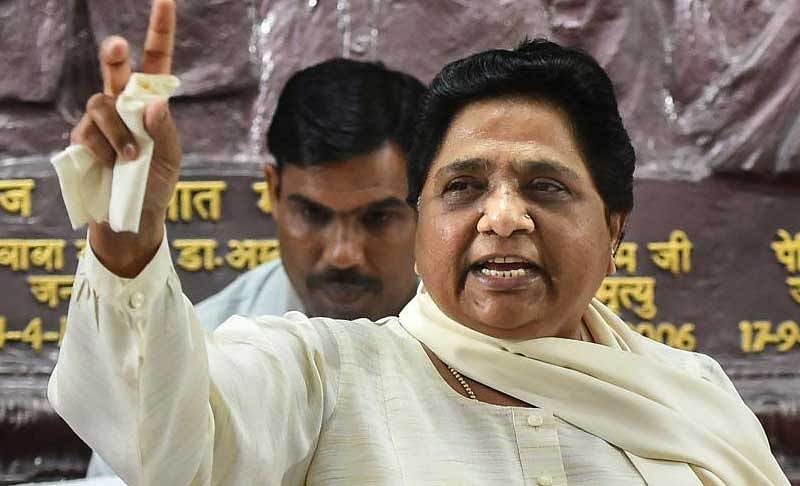
Bahujan Samaj Party (BSP) chief Mayawati’s announcement that she will not run in the upcoming Parliament elections may have surprised her supporters and a section of the political class; but there is a method to her madness.
If everything goes as per the script, she may throw her hat in the ring of prime ministerial aspirants post on May 23. Adding to the intrigue, she dropped hints that her decision not to contest does not preclude her from the race for PM and that she can “win a Lok Sabha election whenever she wants”.
"Keeping in mind the current political situation, I have decided not to contest Lok Sabha polls…I can't let the alliance suffer at any cost. Winning more seats is more important than my victory," she told a press conference.
To become PM she needs to contain regional challengers, the Bharatiya Janata Party (BJP) and the Congress, and in the latter, she finds a long-term adversary as a resurgent Congress could usurp her Dalit base.
In case of a hung House, West Bengal chief minister Mamata Banerjee could also emerge as a credible challenger to Mayawati. In 2014, even at the peak of the Modi wave, the Trinamool bagged 34 out of 42 Lok Sabha seats from the state while the BSP drew a blank in UP. Though a replication may be difficult, Banerjee has acquired more political muscle than Mayawati. The Trinamool chief is personally close to the Congress top brass and many regional satraps; she even had a one-to-one with Shiv Sena chief Uddhav Thackeray in Mumbai a year-and-a-half ago. TMC sources said following her meeting with Mukesh Ambani in connection with Bengal Global Business Summit in Kolkata, the latter not only addressed the summit but also promised to invest Rs.10,000 crore in Bengal’s digital space. They claim that Banerjee has a good rapport with Ambani senior.
In contrast, Mayawati has been playing truant with Opposition leaders unwittingly shrinking her space in national politics. And in a casteist country like India, Banerjee’s Brahmin lineage is also considered an advantage. Besides, the Congress will think twice before propping up Mayawati as PM for the fear of its Dalit votes shifting en bloc to the BSP.
Mayawati has perhaps sensed that chemistry is not in her favour and to recompense chemistry she needs right arithmetic. The SP-BSP-RLD alliance is eyeing some 60 out of 80 seats in Uttar Pradesh, and if that fructifies she will have the backing of a solid block of MPs to buttress her claim for the top job. However, it is easier said than done. BSP’s earlier experiments outside UP were dismal failures.
In 2014, despite contesting 503 LS seats the BSP drew a blank. Even in UP the party was reduced to zilch. In 2009, it contested 500 seats and won just 21 (20 from UP and a solitary seat from Madhya Pradesh). In the last five years the party contested a whopping 1480-odd Assembly elections across 15 states and won a pitiable 13 seats.
In fact, Congress’s unexpected win in MP, Rajasthan and Chhattisgarh in the 2018 Assembly polls, had stung Mayawati and fearing that a Congress revival may jeopardize her Dalit support base the BSP chief reneged on alliance plans. The arrival of Priyanka Gandhi as Congress general secretary in-charge of Eastern UP complicated matters further. Gandhi’s subsequent meeting with Chandrashekhar Azad, chief of the Bhim Army, a fledgeling outfit popular among young Dalits, and the BJP MP and Dalit leader, Savitri Bai Phule, joining the Congress rattled the BSP supremo.
Post demonetization, the ED detected cash deposits worth over Rs 104 crore in an account belonging to BSP and Rs1.43 crore in an account of Mayawati’s brother. On March 12, the IT department reopened a 2002-03 case relating to “bogus” business transactions worth Rs 90 crore and searched a dozen properties in Delhi and Lucknow linked to a retired IAS officer who had been Mayawati’s secretary when she was CM. The same day she announced that her party will not have alliances with the Congress in any state.
Recently, she also rejected an alliance offer by Rashtriya Janata Dal chief Tejashwi Yadav and decided to contest all the 40 LS seats in Bihar. The irony is that in 2015 the BSP contested 228 out of 243 assembly seats in Bihar and drew a blank. Why is she then wasting time, energy and resources outside UP year after year? Her critics suspect that the aim is not to win but play spoilsport — if so, who funds her campaigns?
Mayawati’s plans to campaign aggressively in states could upset the Congress applecart and help BJP. The GoP lost 10 sitting seats to the BJP in Madhya Pradesh in the 2018 Assembly polls thanks to BSP. In 2017, the Congress lost as many as 16 seats in Gujarat by thin margins of 200-2000 votes as parties like the Nationalist Congress Party, BSP and Aam Aadmi Party cut into its base. The Congress lost Godhra to BJP by 258 votes, while BSP secured 898 votes. Is there is a method to Mayawati’s madness? Wait for May 23.
(Kay Benedict is a New-Delhi based independent journalist)